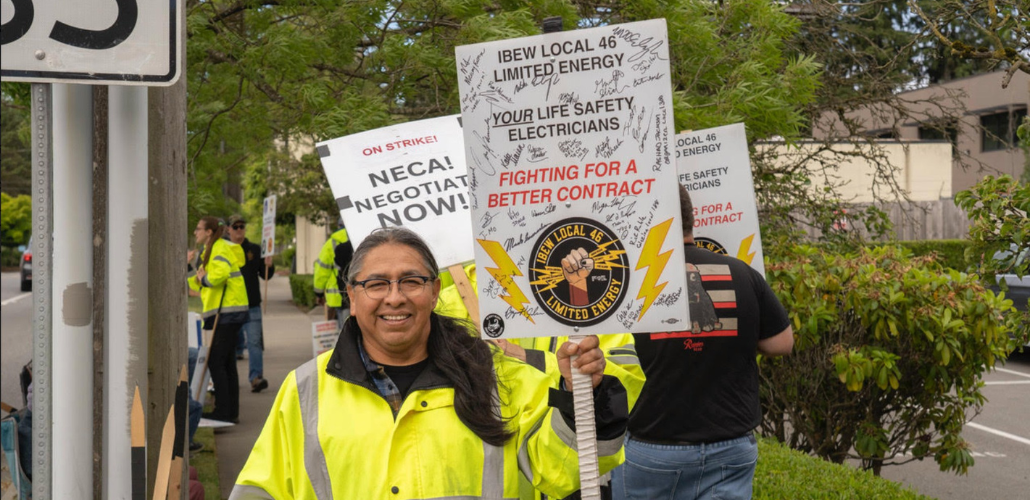Low Voltage Electricians Live to Strike Another Day

Electrical workers stayed out for two months and maintained their right to strike again in the future. Members didn't get a vote on the decision to end the strike, and many weren't happy about it. Photo: IBEW Local 46.
Two months into an unprecedented strike, the 1,023 members of the limited energy construction unit of Electrical Workers (IBEW) Local 46 in Seattle voted overwhelmingly June 11 and again June 15 to stay out.
But the union announced June 17 that it had agreed to end the strike. Members would be voting on a third offer that barely differed from the latest rejected one—the raise had increased by 50 cents.
In an emotional meeting, members were told the strike was ending regardless, and if they didn’t accept this latest deal, with no leverage they would likely end up with something worse. They voted it up by 85 percent.
One big win, though: the union will live to strike another day. For months the employer association had pushed for language that would have effectively given up the right to strike. After a resounding 90 percent no vote on the June 11 offer, it withdrew the never-strike-again language.
SAFETY RADIOS
Since bargaining began, the Puget Sound chapter of the National Electrical Contractors Association had dug in its heels on nearly every issue.
“We only got five answers from NECA in negotiations,” said Local 46 Limited Energy Business Representative Megan Kirby: “‘No. I don’t think so. That’s going to be a heavy lift. We can’t get there. How’s that going to make us money?’”
“NECA told us face to face, ‘Any warm body off the street can do your job,’” said picket captain-general Chelsey Smith.
The union’s top demands were a raise, paid holidays, and walkie-talkies for safety, known as radios. “I’ve been trapped behind doors in basements of job sites without cell service,” said picket captain Alex Hufstetler.
The strike-ending deal included a $12.50 raise over three years. While that might sound like a lot, building trades unions take that total economic package and then vote on how to disperse the lump sum across wages, health care, retirement, and other expenses through the life of a contract.
The deal still included no radios, and nothing on paid holidays except an exploratory committee.
SECOND-CLASS CITIZENS
Limited energy electricians (known in other locals as sound and comm, teledata technicians, or low voltage) are state-certified to install and maintain electrical systems such as data, security, fire alarm, and other life safety and building automation systems.
Their work can be physically demanding and highly technical. Like all state-certified electricians, they’re required to complete continuing education courses every three years.
Yet their pay is well behind most others in the building trades, and nearly $25 an hour behind their closest counterparts, the inside wire commercial electricians.

SUPPORT LABOR NOTES
BECOME A MONTHLY DONOR
Give $10 a month or more and get our "Fight the Boss, Build the Union" T-shirt.
“The disrespect is disgusting,” Local 46 Business Manager Sean Bagsby told a packed auditorium during picket training the first day of the strike. “No more second-class citizens! No more big unit here, little unit there.”
Local 46 has meanwhile also been in bargaining with NECA, representing many of the same employers, for its four other construction units—including the big one, inside wire, whose contract expired May 31.
TARGETED PICKETING
This was Local 46’s first strike since the World War II era. The union and NECA have gotten as far as imminent strike threats… but at the last minute, NECA would always offer a bit more, which the union could bring to members as “the best deal we’ve ever received” and narrowly avert a strike.
This time NECA didn’t blink or make a deal. The longstanding partnership was broken.
On any given day, pickets focused on just five of the many struck job sites, plus usually two contractor offices. Picketers were instructed to stay 50 feet from all entrances and exits and not to engage other trades on the picket line.
“We are not asking others to honor our strike or walk off the job,” Local 46 legal counsel David Hannah emphasized in the training. He said the union’s message was aimed at the employer, the public, and politicians.
This abundance of caution comes in part from the significant legal limitations imposed on construction strikes. Employers commonly set up a “dual gate” system, so workers in other trades can enter the jobsite without technically crossing the picket line.
STRIKELESS INDUSTRY
Strikes in IBEW construction units are vanishingly rare. In many locals a strike is nearly impossible because of contract language that sends disputes to an IBEW-NECA joint arbitration entity, the Council on Industrial Relations.
“We have been known for being the strikeless construction industry,” a top IBEW official boasts on the union’s website. “If it weren’t for the CIR, there’d be a lot more strikes.”
Most IBEW locals have “Standard CIR” language allowing NECA to unilaterally bring disputes to arbitration. But Local 46 and a handful of other locals have “Modified CIR,” where arbitration happens only if both parties agree to it. NECA’s June 11 proposal would have instituted Standard CIR.
The rare strike was a lightning bolt for electricians across the country. Local 666 in Richmond, Virginia, donated $4,999 to the strike fund. “As a local that only recently won paid holidays in our own contract, it’s important that we show solidarity,” said apprentice Phillip Petro.
Dave Pinkham of Local 520 in Austin, Texas, donated one hour of wages. “If they lose the strike and end up with a concessionary contract, that affects IBEW members everywhere,” he said.
Jorge Torres is a Labor Notes labor-climate organizer and a member of IBEW Local 46.




